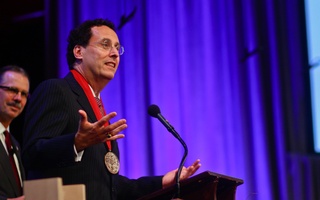THC: Many pieces of music have a premiere, their "first night." But pieces by Shostakovich or Tchaikowsky, for example, don't appear in either your course or your book. How did you decide upon these five pieces?
TK: One reason is that they're great pieces. But you're right to think that other pieces could fit. There's no Mozart or Bach here. First, you have to pick a piece that you know enough about to make a plausible reconstruction of the first performance. For a Bach cantata, you may not know enough about how it worked or when it first was performed. These five pieces also span a broad history of music. We go from the very late Renaissance to 20th-century music. For a person who only studies music in a limited manner, this book may provide guideposts. Furthermore, these are all large-scale pieces. A whole society has to get involved in these performances. People have to copy parts, sweep orange peels, sell tickets, play in the orchestra, etc. Lastly, these pieces all tell a story, they're all narratives of some sort; they're more than just notes. I can't say that any one of these reasons predominates.
THC: The challenge when working with well-known music is to write something original. How does First Nights address these works of music in unique ways?
TK: These pieces are icons, they're placed on a pedestal and worshiped like gods in most books. In this book, we stop studying once the first performance is over. There's a whole lot of scholarship on the later influence of these pieces, but all of those things are built up after the piece. I'm interested in what these pieces were like when they had no history at all, when they played the first note and you didn't know what the second note sounded like.
Read more in Arts
Visual Arts CalendarRecommended Articles
-
ON THE RED PHONE WITH: That KidEveryone talks about not wanting to be “that kid” in section, but few people have actually called him up on
-
Doctorow Pushes for ‘Free Culture’[Editor's note—presented here is a longer version of the Cory Doctorow interview than that which appeared in the print edition
-
SPOTLIGHT: Tracy Kidder '67Tracy Kidder ’67– Pulitzer Prize winner, literary journalist, and Harvard graduate–has been writing award-winning non-fiction for the past 35 years.
-
 15 Questions with Tracy Kidder
15 Questions with Tracy Kidder -
 8 Questions with Tony Kushner
8 Questions with Tony Kushner













